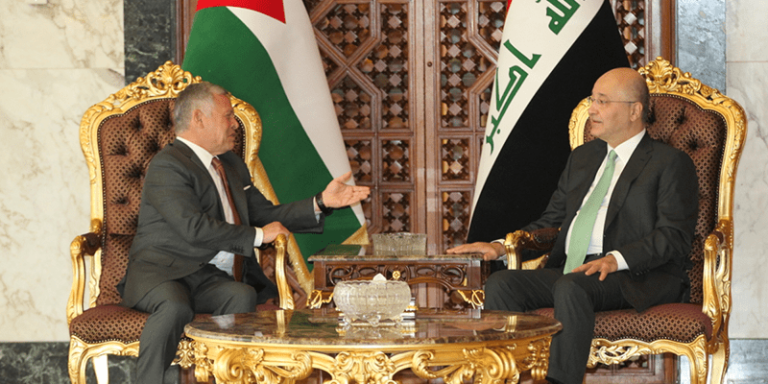
Iraq and Jordan recently signed an agreement on economic cooperation which both governments hailed as opening a new phase in relations between the two countries. Coming amid regional uncertainty, including the continuing fight against the so-called Islamic State (IS), the war in Syria, and Arab concerns about Iran’s influence in the Arab world, this accord is a renewal of old ties. In fact, both countries need each other: Jordan is looking for a market for its goods and for assistance to meet its oil needs, while Iraq wants to find an opening to the Arab world that can mitigate its overreliance on relations with Iran. Indeed, Tehran’s leverage in Baghdad has become too much to bear for many Iraqi political groups.
To be sure, Iraqi-Jordanian relations have improved markedly since the tenure of former Prime Minister Haider al-Abadi (2014-2018). Although that period witnessed a qualitative improvement in security on the international highway linking Baghdad and Amman, following the advances against IS that had occupied western Iraq in 2014, many Shia factions in Iraq have expressed reservations about close bilateral relations that could limit Iranian influence in Iraq. Moreover, they cannot forget the remarks of Jordan’s King Abdullah II in 2004 when he expressed worry about what he called a Shia crescent in the eastern Mediterranean.
Jordan is looking for a market for its goods and for assistance to meet its oil needs, while Iraq wants to find an opening to the Arab world that can mitigate its overreliance on relations with Iran.
The February Economic Agreement
The current year began with a noticeable Jordanian warming toward Iraq with a visit by King Abdullah II to Baghdad where he met with Iraqi President Barham Salih. This visit prepared the way for a meeting on the joint border between the two countries’ premiers, Iraqi Adel Abdul-Mahdi and Jordanian Omar al-Razzaz. It is noteworthy that al-Razzaz spent a good part of his youth with his family in Iraq, where his father Munif was a member of the Baath Party’s regional command but fell out of favor with late President Saddam Hussein. Importantly, Jordan had helped return hundreds of Iraqi historical artifacts it had confiscated from smugglers.
The February agreement between Abdul-Mahdi and al-Razzaz covered the following ventures:
- The establishment of a joint industrial zone on the border composed of equal-sized plots of land donated by the two governments.
- An Iraqi commitment to grant Jordan 10,000 barrels of oil per day to help alleviate the energy crisis. The two governments also agreed to resume special studies to build a pipeline from Basra in southern Iraq to the Red Sea port of Aqaba. This will increase Iraq’s oil exports but also secure transit revenue for Jordan and help in creating employment.
- A Jordanian commitment to help Iraq address its electricity needs over the next two years. This was encouraged by the United States because Iran is currently a major supplier of electricity to Iraq.
- An agreement on joint aviation policies and partnerships between Iraqi and Jordanian airlines.
- An agreement to lower shipping costs for Iraqi goods in Aqaba and increase exchanges in the agricultural sector.
As expected, and despite the positive aspects of the agreement, advocates of Iran in Iraq criticized the warming of relations between the two countries.
As expected, and despite the positive aspects of the agreement, advocates of Iran in Iraq criticized1 the warming of relations between the two countries. By contrast, many of Iraq’s leaders eager to open Iraq to the Arab world have hailed the developments as favorable. One of these is former Prime Minister Iyad Allawi, although he thought they were a little late. However, it is expected that the agreement will reflect positively on the two countries and will help end Iraq’s isolation from the Arab world.
Other Significant Benefits
The agreement is but one development in Iraqi-Jordanian relations. The two countries have other common challenges that further cooperation will help address.
Terrorism and the Islamic State. IS control over western Iraq, and the organization’s reach into parts of Syria before it began losing territory there, have presented Jordan with serious security and economic challenges. Amman feared IS’s ability to infiltrate its borders from Iraq or to establish areas of influence among the Syrian refugees on Jordan’s northern border with Syria. This prompted the Jordanian government to coordinate security affairs with the Syrian army after Damascus gradually reestablished its control over southern Syria. With similar cooperation between Jordan and Iraq, and with the general agreement on political and security issues between Iraq and Syria, a tripartite cooperation can help the important mission of fighting terrorism.
Iraq’s success in eradicating the Islamic State from its western territories and the organization’s loss of areas it controlled in the Syrian desert will assure the safety of people and goods traversing the tri-border area. This also will help Saudi Arabia. What may negatively impact such a scenario is the planned American withdrawal from Syria that is likely to leave Iraq exposed to the possibility of an IS resurgence after the group’s fighters are fully expelled from Syria.
Iraq’s success in eradicating the Islamic State from its western territories and the organization’s loss of areas it controlled in the Syrian desert will assure the safety of people and goods traversing the tri-border area.
The Functional Linkage: Iraq represents a large market for Jordanian goods and entrepreneurs, especially at this time of economic challenges for the kingdom and its youthful population. Further, Iraq is a good market for Jordanian agricultural goods since the sector is undergoing what may be called a gradual collapse because of neglect, disinterest among Iraqis, and lack of sufficient funding. Iraqis are also seeking to live in urban centers, in the process abandoning good agricultural lands in pursuit of white-collar employment and membership in the many militias dotting the country’s political landscape.
Energy. Perhaps cooperation on energy is the most consequential among the issues in the signed agreement. For the foreseeable future, it ensures Jordan’s continued supply of oil from Iraq’s Kirkuk fields (some of which will be an outright grant as the rest is priced competitively). But Jordan is also interested in pushing plans for the Basra-Aqaba pipeline as Iraq may also want to reopen the old pipeline between Kirkuk and Haifa––shut since the establishment of Israel in 1948. These plans are wholly connected to where Iraq stands regarding relations with Israel, which has a peace treaty with Jordan. Importantly, Israel quietly lifted restrictions on trade with Iraq and no longer considers the country an enemy; these are conditions that would undoubtedly directly or indirectly pave the way for an open Jordanian-Iraqi-Israeli relationship. Such a potential eventuality would add Iraq––Iran’s friend and conduit to Syria and Lebanon––to the list of Arab countries normalizing relations with Israel. It is thus of utmost importance for Iraqi officials to remain vigilant that whatever develops with Jordan does not lead to an Iraqi-Israeli rapprochement in the future.
Additionally, Jordan could help Iraq achieve some independence from Iran in the field of electricity. Increasing cooperation between the two countries would help connect Iraq to a future five-country electrical network in the eastern Mediterranean. While securing supplies of electricity from Arab sources, it would lessen Iran’s monopoly in that sector and free the country from the arbitrary pricing that Iran imposes. It is likely that this also would be encouraged by the Trump Administration so that Baghdad can lessen its reliance on Tehran.
Business relations. Jordan hosts a large contingent of Iraqi Sunni businessmen who have succeeded in garnering support inside Iraq despite their reluctance to play any political role in the country. They have become representatives of the Iraqi Sunni moneyed class that can use its capital for political ends. As Sunnis in Iraq continue to feel marginalized, their compatriots in Jordan could encourage Sunni political factions and constituencies to be more involved in the Iraqi political process. As host to their businesses, Jordan can play a pivotal role not only in helping this dynamic but also in assisting in reorienting Iraq to its Arab environment and away from Iran.
The recent economic agreement between Iraq and Jordan is a mutually beneficial tool of cooperation. It helps Iraq to ensure its future prosperity and support its long-term openness to the Arab world while allowing Jordan to secure a guaranteed and profitable market for its goods as well as a source of needed energy. The two countries could also use the increased cooperation to jointly face the challenge of the Islamic State and the uncertain future of war-torn Syria.
1 Source is in Arabic.

